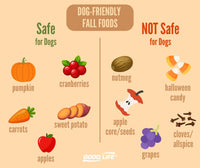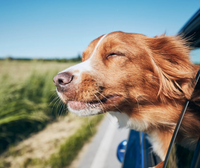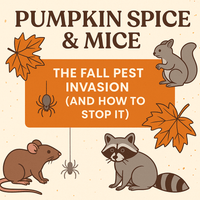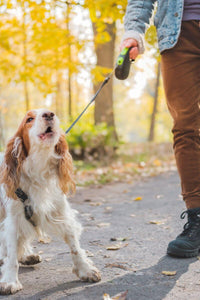Subtotal
$0.00
or
Gastic-dilatation-volvulus (also known as GDV) is when a bloating stomach twists or rotates, a life-threatening condition in dogs. It's name is long, but perfectly describes what occurs and it's very serious business.
It's cause isn't very clear, though, but it often occurs in older, large breed, deep-chested dogs who receive one big meal a day or have relatives that have endured it. Any dog can be affected, but the most common breeds are Great Danes, Weimaraners, St. Bernards, Irish setters, and Gordon setters. Interestingly, aggressive dogs seem to be at higher risk,
writes Dr. Ron Castron, DVM, PhD, CVA. There also appears to be an increased risk if a susceptible dog is fed primarily dry kibble dog food in one or two large portions each day, compared with those that are allowed to eat smaller meals throughout the day or are fed canned foods. In addition, high fat content in foods has been associated with increased risk.
Initially, dogs may anxiously look at the abdomen along with standing and stretching, panting and drooling. As it progresses, they will have more intense focus on their distended abdomen, unproductive vomiting, and difficulty breathing. These later signs reflect the fact that GDV is a serious problem that affects the whole body. The bloating stomach puts pressure on the blood vessels, reducing the ability of the blood to properly circulate. Pressure on the diaphragm makes breathing difficult. When the stomach rotates, the blood circulation in the body and stomach is further compromised. Toxins begin to be released. Irregular heartbeats can occur.
The sooner GDV is diagnosed and treated , the better. No time should be wasted, so contact your vet immediately if you believe your dog has GDV.

Dog Logic vs. Human Logic: Why Your Dog Thinks the Mailman Is a Monster

Fall-Friendly Foods for Dogs: What They Can (and Can't) Eat This Holiday Season

Traveling with your dog doesn’t have to mean constant barking or stress. With preparation, consistency, and the right tools, you can make the season memorable for all the right reasons.

Fall might be the season of pumpkin spice and cozy nights, but it's also prime time for pests to sneak into your home. As temperatures drop, mice, squirrels, raccoons, and spiders go into survival mode. From scratching in the walls to overturned trash cans, these freeloading critters can cause big headaches if you don't stop them early.

Fall is one of the busiest seasons for wildlife — and that often means more barking from your dog. From squirrels and raccoons to deer in the backyard, autumn critters can stir up a lot of noise and stress. Discover simple, humane solutions to keep pests away and calm the barking so you can enjoy a quieter, cozier season.